Table of content
Black chicken soup, a cherished remedy in traditional Chinese medicine (TCM), has been revered for centuries as a potent elixir for replenishing vital energy (qi) and blood. Often simmered with a careful selection of herbs, this broth is believed to restore balance, enhance immunity, and promote overall well-being. For those seeking to harness the healing power of TCM, understanding which herbs to add to black chicken soup is paramount. This article explores the science and tradition behind ten medicinal herbs that amplify the soup’s ability to nourish qi and blood, along with preparation tips and cultural insights.
The Philosophy of Qi and Blood in TCM
In TCM, qi is the vital force that animates all living things, circulating through meridians to sustain bodily functions. Blood, closely intertwined with qi, nourishes tissues, moistens the skin, and anchors the spirit. A deficiency in either can lead to fatigue, pale complexion, dizziness, or weakened immunity. Black chicken, or Silkie chicken, is prized for its dark-colored flesh and bones, which TCM practitioners associate with its rich iron content and ability to tonify the kidneys and liver—organs critical for qi and blood production.
10 Herbs to Elevate Your Black Chicken Soup
Ginseng (Ren Shen)
Panax ginseng, or ginseng, is the “king of herbs” in TCM, renowned for its adaptogenic properties. It invigorates qi, boosts vitality, and enhances mental clarity. When added to black chicken soup, ginseng’s warming nature complements the chicken’s nourishing effects, making it ideal for those recovering from illness or chronic fatigue.
Preparation Tip: Use 3–5 slices of dried ginseng root. Simmer gently to avoid overpowering the broth’s flavor.
Astragalus (Huang Qi)
Astragalus membranaceus strengthens the spleen qi, the body’s energy reservoir, and supports immune function. It is particularly beneficial for individuals with weak digestion or frequent colds. Paired with black chicken, astragalus creates a tonic that fortifies the body’s defenses.
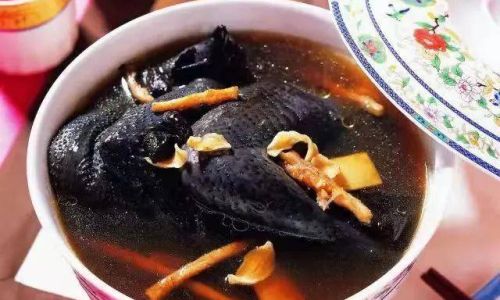
Scientific Insight: Modern studies suggest astragalus contains polysaccharides that modulate immune cells, potentially reducing inflammation.
Dang Shen (Codonopsis Pilosula)
Often called “poor man’s ginseng,” dang shen is a milder alternative that tonifies qi without the intensity of ginseng. It aids in appetite stimulation and addresses fatigue caused by stress or overwork. Its sweet, neutral flavor blends seamlessly into soups.
Culinary Use: Add 10–15 grams of dang shen slices during the initial simmering phase.
Goji Berries (Gou Qi Zi)
These vibrant red berries are rich in antioxidants, vitamins, and minerals. In TCM, goji berries nourish the liver and kidneys, enhancing blood production and improving vision. Their subtle sweetness adds a pleasant tang to the broth.
Fun Fact: A 2017 study linked goji berry consumption to increased antioxidant levels and reduced oxidative stress.
Red Dates (Hong Zao)
Red dates, or jujubes, are a staple in TCM soups for their ability to harmonize the stomach and replenish qi. They contain iron and vitamin C, which aid in blood formation and absorption. Their natural sweetness balances the earthy tones of other herbs.
Preparation: Use 8–10 dried red dates, pitted to prevent bitterness.
Longan Fruit (Long Yan Rou)
Longan fruit, often dried, is a beloved TCM ingredient for its blood-tonifying and calming properties. It addresses insomnia and anxiety while nourishing the heart and spleen. When combined with black chicken, it creates a broth that soothes the spirit.
Cultural Note: Longan is traditionally consumed during postpartum recovery to aid healing.
Chinese Yam (Shan Yao)
Dioscorea opposita, or Chinese yam, strengthens the spleen and lungs while replenishing qi. Its mucilaginous texture thickens the broth slightly, offering a comforting consistency. Ideal for those with digestive weakness or loose stools.
Nutritional Benefit: High in fiber and potassium, Chinese yam supports gut health and electrolyte balance.
Codonopsis (Dang Shen)
While similar to dang shen, codonopsis root is sometimes used interchangeably in recipes. It shares the same qi-tonifying benefits but is slightly cooler in nature, making it suitable for those prone to heatiness.
Pairing: Combine with astragalus for a balanced qi-boosting effect.
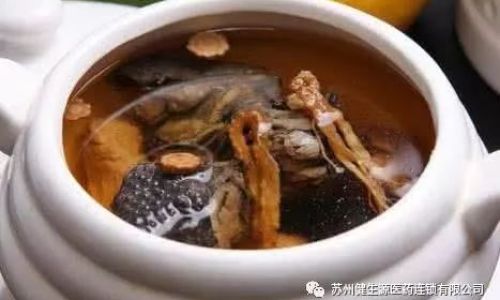
Angelica Root (Dang Gui)
Angelica sinensis, or dong quai, is the “female ginseng,” renowned for regulating menstruation and enriching blood. It contains iron and coumarins, which improve circulation. Men should consume it sparingly due to its estrogen-like effects.
Caution: Avoid during pregnancy or if taking blood-thinning medications.
Reishi Mushrooms (Ling Zhi)
Reishi, the “mushroom of immortality,” enhances immune function and reduces stress. Its bitter taste mellows during long simmering, imparting depth to the broth. Modern research highlights its anti-inflammatory and antitumor properties.
Preparation: Use 5–10 grams of dried reishi slices; remove before serving as they are tough.
How to Prepare Nourishing Black Chicken Soup
-
Ingredients:
- 1 whole black chicken (organic preferred)
- 2 liters of water
- 3–5 ginseng slices
- 10g astragalus
- 15g dang shen
- 10 red dates (pitted)
- 15g goji berries
- 50g Chinese yam (sliced)
- 10g longan fruit
- 10g codonopsis
- 5g angelica root (optional)
- 5g reishi (optional)
-
Instructions:
- Blanch the chicken in boiling water to remove impurities.
- Rinse herbs thoroughly.
- Simmer all ingredients in a clay pot on low heat for 3–4 hours.
- Skim foam occasionally.
- Add salt to taste 10 minutes before serving.
Variations:
- Postpartum Recovery: Increase goji berries and longan fruit.
- Menopause Support: Add black sesame and lotus seeds.
- Winter Warmth: Include ginger and cinnamon.
When to Avoid Black Chicken Soup
While generally safe, certain groups should exercise caution:
- Fever or Infection: The soup’s warming nature may exacerbate symptoms.
- Digestive Issues: Overconsumption can cause bloating; start with small portions.
- Medication Interactions: Consult a doctor if taking anticoagulants (due to angelica root) or immunosuppressants (due to astragalus).
The Cultural Significance of Black Chicken Soup
In many Asian cultures, black chicken soup is a symbol of care, often prepared for new mothers, the elderly, or convalescents. Its preparation is an act of love, requiring patience and attention to detail. The ritual of simmering herbs and chicken over hours mirrors the slow, deliberate process of healing.
Modern Adaptations
Contemporary chefs and TCM practitioners now blend tradition with innovation. Some add bone broth for extra collagen, while others incorporate turmeric or garlic for anti-inflammatory benefits. However, purists argue that altering the recipe too much diminishes its therapeutic effects.
Conclusion
Black chicken soup, enriched with carefully chosen herbs, is more than a meal—it is a centuries-old tradition of holistic healing. By understanding the properties of ginseng, astragalus, goji berries, and their companions, you can craft a broth that nourishes qi, enriches blood, and revitalizes the body. Whether recovering from illness or seeking preventive care, this soup remains a timeless testament to the marriage of culinary art and medicinal wisdom.
Final Tip: For personalized advice, consult a TCM practitioner to tailor the herb selection to your constitution. Remember, balance is key—even in a bowl of soup.



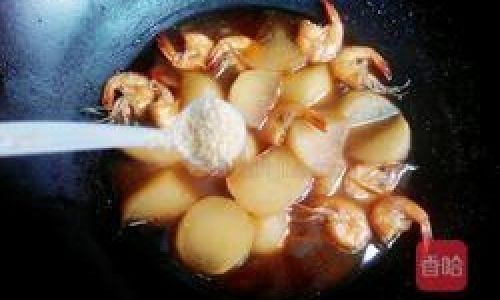
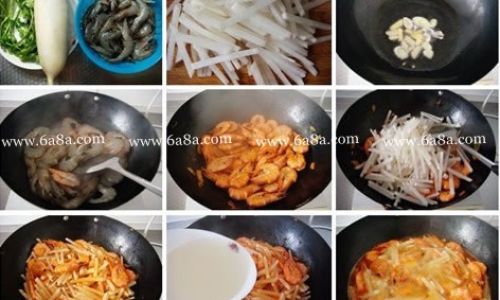
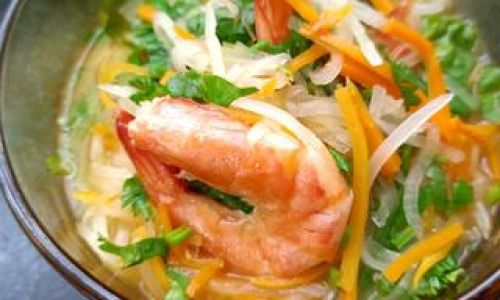
0 comments